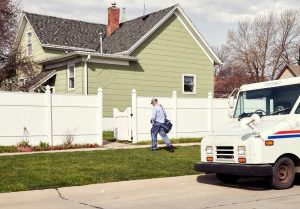Unions are the most powerful advocate people like my parents have. That power is one of the reasons that, although the U.S.P.S. is by far the most popular government agency, it is the one most often threatened with extinction. My mother is about to retire, and I worry that the agency she has spent her life serving will be retired soon, too. The coronavirus, which has decimated the global economy, has not spared the Postal Service—and while shipping and package volume are on the rise, standard and bulk mail have plummeted, leaving the U.S.P.S. with increasing deficits. But if the coronavirus kills the Postal Service, its death will have been hastened, as so many deaths are right now, by an underlying condition: for the past forty years, Republicans have been seeking to starve, strangle, and sabotage it, hoping to privatize one of the oldest and most important public goods in American history.
Before they declared their independence, the American colonists decided that they needed a better way to communicate with one another. In the summer of 1775, at the Second Continental Congress, they created the Postal Service and named Benjamin Franklin its first Postmaster General. Where before letters or packages had to be carried between inns and taverns or directly from house to house, now there was a way for Americans to safely, discreetly, and reliably correspond across long distances. After the Revolution, when Congress ratified the Articles of Confederation, legislators included the Post Office in the ninth of those articles, and later enshrined it in the first article of the Constitution.
The Founders saw the Postal Service as an essential vehicle for other rights, especially the freedom of the press: one of the first postal laws set a special discounted rate for newspapers. But they also understood that a national post unifies a nation, allowing its citizens to stay connected and connecting them with their federal government. When Alexis de Tocqueville toured the young country several decades after its founding, he travelled partly by mail coach, noting in “Democracy in America” how “the mail, that great link between minds, today penetrates into the heart of the wilderness.”
But the mail didn’t just follow American settlers into the wilderness—it also led to the transformation of the frontier. The constitutional authority that created the Postal Service allowed for the construction of post roads to link faraway cities; eventually, these ran all the way from Florida to Maine. A few of those essential byways survive, some of them obvious in their names, like the Old Albany Post Road and the Boston Post Road. Later, that authority was interpreted more broadly to justify federal investment in railroads and highways. During its long history, the Postal Service has delivered the mail by pony express, mule train, float planes, ferry boats, motorcycles, skis, hovercrafts, and pneumatic tubes. There were only seventy-five post offices at the nation’s founding, but by the time the Civil War started there were more than twenty-eight thousand spread around the country.

Leave a Reply